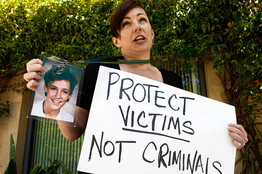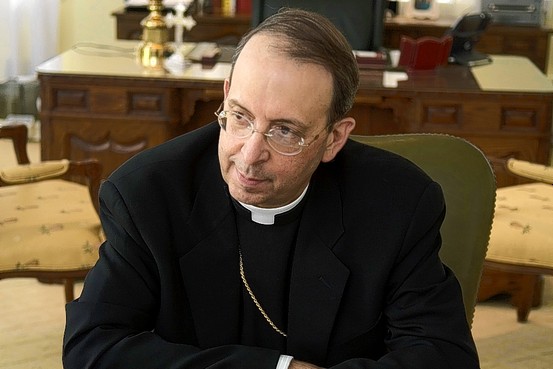By Ashby Jones
The Wall Street Journal
April 29, 2010
http://online.wsj.com/article/SB10001424052748703572504575214220666049534.html?mod=WSJ_hpp_sections_world
 |
| Joelle Casteix of the SNAP advocacy group for abuse victims protests Wednesday in Los Angeles. |
Latest Scandals to Hit the Catholic Church Ratchet Up Pressure on State Lawmakers to Extend or Eliminate Statutes of Limitations
The recent wave of accusations that the Catholic Church has mishandled sexual-abuse cases is giving new momentum to state efforts to extend the time frame for alleged victims of childhood abuse to sue the church.
Legislatures in a handful of states, including Connecticut, Arizona, New York and Michigan, as well as the territory of Guam, are considering lengthening or eliminating their statutes of limitations in sex-abuse cases. On Monday, the Florida legislature voted to abolish its time limitations in any new cases filed. The church has been lobbying against such measures, which typically apply to all sexual-abuse cases, not just those involving the church.
The state efforts to extend the time period in which people can sue for harm were begun before the latest string of allegations against the church. These include allegations against church leaders, including Pope Benedict XVI when he was Cardinal Joseph Ratzinger, of failing to quickly defrock priests in Wisconsin, Oakland, Calif., and pockets of Europe, despite knowledge or warnings that the priests had sexually abused children.
 |
| Bishop William Lori, who ordered a probe of a Connecticut pastor over misspent funds, in 2006 |
The Vatican has denied wrongdoing in instances in which it has been accused of failing to act expeditiously in disciplining priests. It has acknowledged abuse and offered apologies for incidents of sexual abuse by priests. The pope recently ordered a delegation to investigate abuse in Irish dioceses.
Supporters of the current bills say the recent attention has helped push pending legislation forward. "It's moved the issue back onto the stage," said Beth Bye, a Connecticut state representative who supports a pending bill. She added that more alleged victims have come forward to tell their stories in the wake of the latest news on the scandal. "It's the personal stories that move lawmakers," she said.
In many states, a statute of limitations is "tolled" or paused until a child turns 18, at which point a person will typically have a limited number of years to file a suit.
Victims of sex abuse and other advocates have for years lobbied state legislatures to change statutes of limitations in sex-abuse cases. About half of the states have enacted some change before the recent batch of allegations, said David Clohessy, the executive director of the Survivors Network of those Abused by Priests, or SNAP, an advocacy and support group.
Many states have extended the statute of limitations to file new cases for a handful of years. A small number have eliminated their statute of limitations altogether and two, Delaware and California, have opened up windows, or limited periods of time, in which individuals could retroactively sue over incidents that happened much earlier. Efforts to open windows have been defeated in some states, including Ohio, Wisconsin, Colorado and Maryland.
The situation in Connecticut has been particularly contentious. Lawmakers introduced the bill largely to address a case involving not a priest, but a doctor, George Reardon, who worked at St. Francis Hospital and Medical Center in Hartford from 1963 to 1993 and died in 1998. In 2007, the owner of his former home found thousands of slides and more than 100 movie reels of child pornography hidden in a wall. Since then, 143 people have sued St. Francis over alleged abuse committed by Dr. Reardon. Calls to the lawyer for St. Francis weren't immediately returned.
Connecticut currently cuts off the statute of limitations 30 years after the age of majority, or 18. The bill would change this, allowing people aged 48 or over to sue in certain circumstances. Rick Kenny, a lawyer representing many of the plaintiffs in a consolidated case against the hospital, said "it's completely arbitrary" that anyone under 48 can sue, while people 48 or older can't.
The church—which has no connection to the Connecticut doctor—objects to the bill on a number of grounds, including that it would force the church to defend claims that are, in some instances, 40 or 50 years old. "We simply think it's unfair," said Michael Culhane, the executive director of the Connecticut Catholic Public Affairs Conference, the public policy and advocacy office for Catholic bishops in Connecticut. "It's changing the rules in the middle of the game."
Two bishops and an archbishop in Connecticut earlier in April asked Catholic priests throughout the state to read statements opposing the bill to their parishioners. The church statements said that in other states which had recently suspended their statutes of limitations, dioceses had been driven into financial ruin. "This bill," the letter continued, "would put all Church institutions, including your parish, at risk."
The church generally doesn't rebut claims that sex abuse can cause serious harm. But it argues it has put other measures in place to stop sex-abuse by priests and says the changes to statutes of limitations have taken a steep and unfair financial toll. "Dioceses have filed for bankruptcy over this." Mr. Culhane said.
Separately, both houses of Florida's legislature voted Monday to eliminate criminal and civil statutes of limitations for all sexual battery of anyone age 15 and under. Florida Gov. Charlie Crist has indicated he would likely sign the bill.
Michael McCarron, executive director of the Florida Catholic Conference, which speaks on behalf of Catholic bishops in that state and had opposed the bill, said in a statement: "While we remain of the view that a reasonable time limit for institutional liability is appropriate, we are respectful of final actions of the Florida legislature." In an earlier letter to state Sen. Jeff Atwater, Mr. McCarron said the "primary concern " had to do with forcing employers to "defend against complaints occurring decades ago."
Write to Ashby Jones at ashby.jones@wsj.com
Any original material on these pages is copyright © BishopAccountability.org 2004. Reproduce freely with attribution.